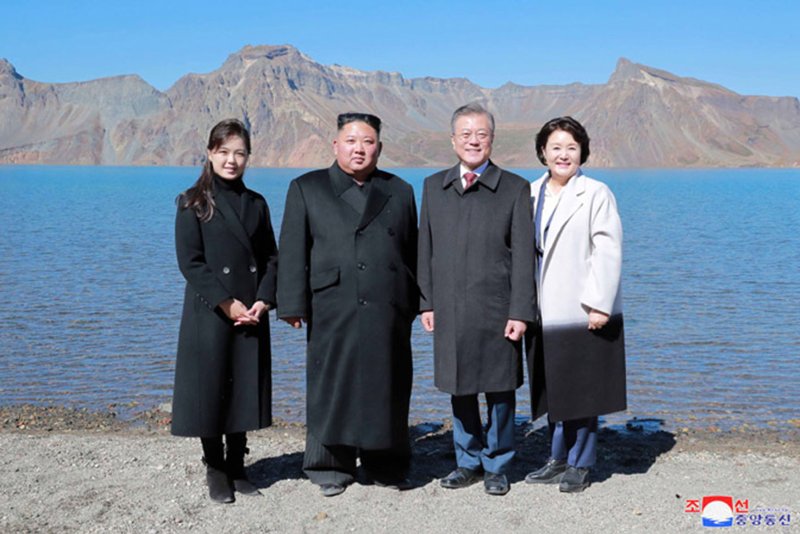North Korean leader Kim Jong Un (C-L) and South Korean President Moon Jae-in (C-R) visit Mount Paektu with North Korea first lady Ri Sol Ju (L) and South Korea's Kim Jung-sook, in September 2018. Earthquakes have been recorded in the area according to a North Korean scientist on Wednesday. File Photo by KCNA/UPI |
License Photo
May 30 (UPI) -- A North Korean scientist disclosed a sacred mountain in his country has experienced multiple earthquakes in the last three years.
Kim Hyok, a scientist at North Korea's earthquake monitoring agency, said Wednesday at a research conference in Milton Keynes, Britain, that Mount Paektu has experienced at least 10 earthquakes from 2016 to 2018, South Korean news service News 1 reported Thursday.
British scientists at the conference expressed similar concerns about increased instability at the mountain that includes a crater lake known as Chonji, or Heaven Lake.
The mountain holds significance in North Korea. The regime has claimed it is the official birthplace of Kim Jong Il, father of Kim Jong Un, the current leader.
Kim Hyok said this week the North Korean government is closely monitoring the density, gravity and magnetic field changes on the ground.
Kim also said the volcanic mountain erupted in 946 A.D., and ashes at the time covered Hamgyong Province and reached as far as Hokkaido, in northern Japan. Nearly two inches of ash accumulated in Japan at the time, he said, and led to a catastrophic loss of lives and crop damage in northern Korea.
James Hammond, a senior lecturer in geophysics at Birkbeck, University of London, said at the conference overall earthquakes in the Paektu region have declined.
Hammond said tremors near the mountain rapidly decreased starting 2006, but the reasons are not known. Hammond also said minor earthquakes occurred more than 3,000 times between 2002 and 2005.
Nature may be affecting North Korea in other ways.
Pyongyang has said the country is fighting the impact of drought, and has asked for an international response.
On Thursday, KCNA reported the International Federation of Red Cross and Red Crescent Societies have been involved in relief action, "steadily increasing the number of volunteers to strengthen its emergency response ability."
South Korea has offered aid but the North has not taken steps to issue an official response to expedite the South's aid into the country.















